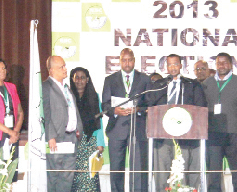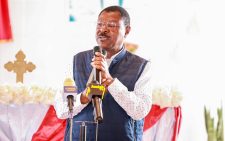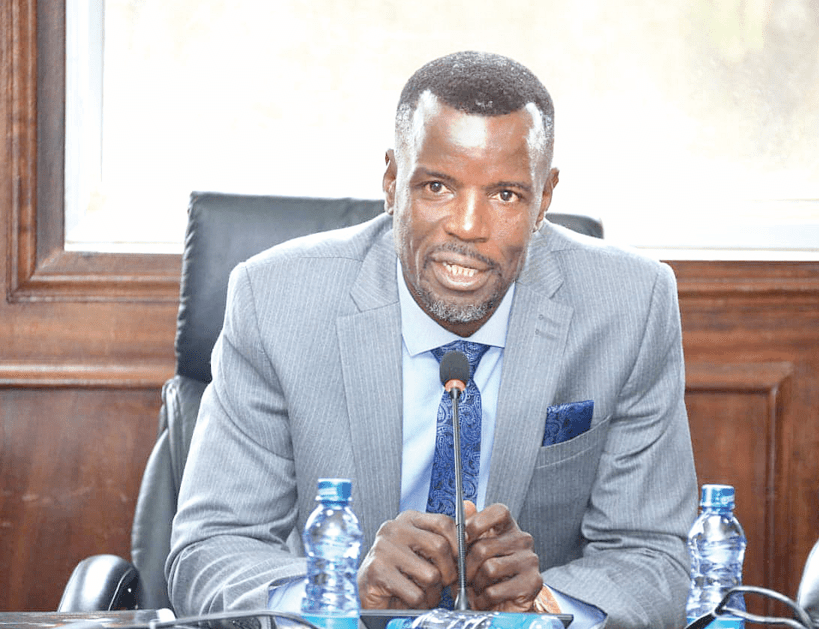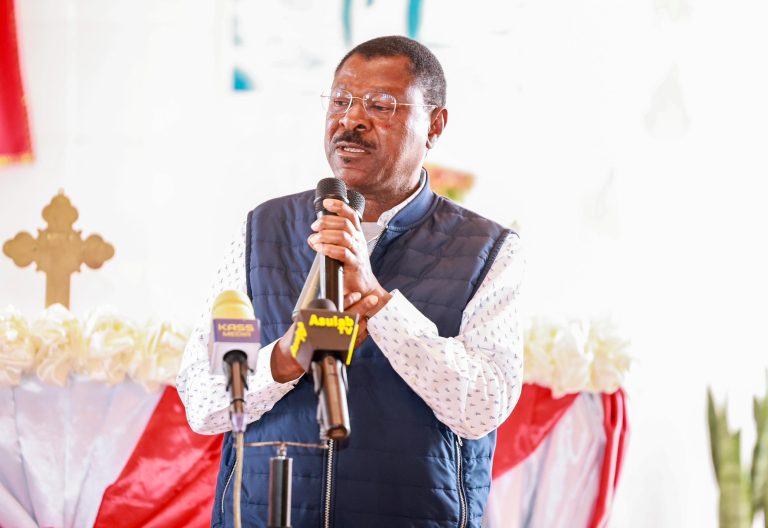When things started falling apart at IEBC despite chairman’s resistance

The bone-weary commissioners had begun expressing their desire for us to seriously consider our exit for the sake of the nation. We had been on the political chopping block long enough, and the older commissioners were more weary than the rest from all the battering.
Commissioner (Eng. Abdullahi) Sharawe proposed that we should write to the President, offering to resign, to avoid any further chaos in the country. We were to request for our benefits as we stepped down. Although we had deliberated often on what to do, this was the first time the matter on resignation came up for discussion among the commissioners.
Sharawe went ahead and drafted a letter to the President. He presented it in one of our meetings, suggesting that we should all sign it. His decision may have been influenced by the recommendations David Makali made when he came on board as our communications adviser.
The chairperson in the Office of the Ombudsman, Otiende Amollo, had also issued an advisory in January 2016. He stated that the nine of us could only leave office through the setting up of a tribunal, as outlined in the law. However, he went on to say that on grounds of national interest and for the greater public good, the IEBC commissioners should be encouraged to voluntarily and honourably resign and receive our full benefits. He argued that even if we conducted the 2017 election, we would not be in office long enough to conduct a run-off if it was required, which would plunge the country into a constitutional crisis.
I concurred with him about being given a dignified exit, but disagreed with his sentiments about the commission not being in office to conduct a run-off, as this claim was not true. A run-off, mostly scheduled 30 days after the day of the election—8th August, 2017—would still find us in office. Our six-year term was to run until 8th November, 2017.
I cautioned Sharawe about ambushing the President on the matter through the letter, since we had already seen how quickly information from the commission was leaking to the public and the media. I proposed that given there was a protocol the government followed on such issues, it was best to consult first, then follow up with the official letter.
Sharawe proceeded to ignore my suggestion. It was unfortunate that Sharawe came off as one who had seen it all and knew it all. It was difficult to advise him. This made him impervious to reason and logic. He proceeded to sign the draft, and managed to convince three others—Commissioners Galma (Boru), (Albert) Bwire and (Yusuf) Nzibo to sign it as well. The vice chair, Lillian (Mahiri-Zaja), (Thomas) Letangule, (Mohammed) Alawi, Muthoni (Wangai) and myself did not sign the letter.
Lillian almost went ahead to sign the draft. She was reminded by Letangule, however, that if she did, she would be accused of sabotaging the chairman. On that account, she stuck with the five of us.
I was scheduled to attend a Commonwealth forum in Trinidad and Tobago soon afterwards, and I was accompanied by Alawi. I attended the forum in my capacity as the chairman of the Commonwealth Electoral Network (CEN), which brought together the heads of electoral commissions of the Commonwealth countries. Part of the reason I was there was to hand over to the incoming chairman of the network.
Leaked letter to media
I checked my messages during our stopover in London, while waiting for the connecting flight in the lounge, and found social media flooded with news of the signed letter to the President from the four commissioners. The Standard newspaper carried the explicit headline ‘IEBC commissioners’ secret letter to President Uhuru Kenyatta’. They revealed details of the letter, written on 20th June, 2016, and in part it read, ‘We the commissioners of the Independent Electoral and Boundaries Commission resolve that for the sake of our country, a sign of nationalistic gesture, for purposes of investments in Kenya for the present and future generations, in the interest of peace and harmony and in good faith, wish to express our willingness to voluntarily retire from public service, in order to accord new commissioners adequate time to settle and prepare for elections.’
I was deeply dismayed that the commissioners had not only ignored my suggestion, and sent the letter to the President, but that it had also been leaked to the media. The confidentiality of the matter had been broken. Leaking such a sensitive issue as resigning before a formal engagement had taken place was not prudent for a government official. Even with the disappointment I felt, there was little I could do.
It was now evident that we were divided as a commission. It became a big story, with the media making projections on our numbered days. The older commissioners were perceived as being more conservative and reasonable, as they had finally opted to resign. The younger commissioners were labelled ‘radicals’. Articles were written to analyse the situation, pitting us against each other as the radical wing and the conservative wing. Alawi and I travelled back five days later, and I called for a meeting with the commissioners to address the issue.
“Why did you do this when we had already agreed in our last meeting that we needed to follow the right procedure in this matter?” I asked in frustration.
“Chairman, we are tired! We cannot go on like this any longer,” Nzibo responded.
Sharawe echoed Nzibo’s sentiments and declared that he also wanted to go home. Letangule interjected in an unexpected burst of frustration while addressing Sharawe.
“You have always tried to undermine the chairman; I’m telling you the truth! You have always tried to create your own power base. You think you’re always right because you are more experienced, given how long you have worked in the government. You think you know everything and have always tried to undermine the chairman. This is the truth! He has given you a lot of respect all this time, but on this one, you have now gone overboard!”
This outburst took everyone by surprise, including Sharawe. Not only had we worked closely together as commissioners after being appointed, but we had also become like family over time. We stood with each other whenever the need arose. My mind went back to the time when Letangule lost his wife, Esther, on 10th April, 2013. This was barely a month after the general election. It was deeply saddening to all of us, and we accorded him and the family all the support we could. Letangule was well-liked in the team as he had a great sense of humour, and knew how to tactfully employ comical quips to defuse tension. We were guaranteed to have light moments with him around. It went a long way toward relieving some of the constant stress we faced on a daily basis.
Letangule was the only one among the commissioners who could stand up to Sharawe in this way. He must have felt that the family we had been all along was now being fractured.
“Please bwana please, calm down Letangule,” Sharawe said, trying to cool the rising tension in the room.
The commissioners shared Letangule’s sentiments. They may have held back from speaking about it previously, in view of Sharawe’s age. However, they had reached the limit of their patience. Sharawe was rattled by the disclosure, which was made worse by the blunder in sending the letter to the President against my advice.
President’s phone call
Sharawe had links to senior, former government officials whom he had worked with during his long tenure in the civil service. He also had good relations with senior ODM leaders. He had served on the Interim Independent Boundaries Review Commission (IIBRC) and was the only one from this commission who had joined the IEBC, so in a sense, he had considerable political mileage. He seemed to have information from the opposition that would benefit the commission when we had our meetings, and he was always eager to have the last word. I had observed a pattern; whenever his advice was not taken, he would object to the decision that was made. I calmly observed the heated exchange then spoke after the emotions had cooled.
“Okay, si mmetuma barua? Tungoje majibu basi.” Since they had already sent the letter, I told them we had no choice but to wait for the response, then wrapped up the meeting.
Meanwhile, I received calls about the leaked letter and the ripple effect it was causing.
“Chairman, President amekasirika sana na hiyo barua,” Kihara, from the Office of the President said on a phone call. He told me that the President was very upset about the letter. He went on to add that he heard the President say, ‘Now that they have said they want to resign, wanangoja nini?’ The President wondered what the four who had expressed their desire to resign were waiting for.
“Will they be getting a response?” I asked. I understood the impasse we were in.
“No, it will not come. Amesema mkae ngumu. Mkae ngumu and he will not respond to the letter,” Kihara responded, divulging that the President had insisted we stay put.
It was an awkward place to be for the four commissioners on the days that followed. No response was forthcoming from the President. Given that they had apparently hung their boots, their attendance in the commissioners’ meetings was filled with uncertainty, as they tried to push me to have us meet the President. They knew they had betrayed the unity we had operated in.
Media platforms capitalised on our disunity and turned up the volume for our exit.
A short while later, I received an invitation to take part in the Election Visitor Programme in Australia as they held their election. I was to be accompanied by Letangule on the trip. We were scheduled for a meeting with the Deputy President before our flight, and we went to his office early in the morning. Letangule stepped out of the Deputy President’s VIP lounge briefly as we waited to see him and gave me an update on getting back. He had just seen Sharawe and Nzibo in a different room, also waiting to see the Deputy President. They had come to the office much earlier than us and were startled upon seeing Letangule. He was the last person they expected to see in the DP’s office. We were ushered shortly afterwards into his office, where we had a conversation on the latest developments in the commission.
“My commissioners, Sharawe and Nzibo, are here to see you,” I told the Deputy President. “I know you are aware that they betrayed us.”
Eldest commissioner
“I’m aware, Chairman, lakini unajua hao ni wazee, nyinyi ni vijana, so you can survive these things,” he said, pointing out that they were elderly, and we were much younger, so we were more resilient against the onslaughts the commission was facing.
We found out that the two elderly commissioners had sought the DP’s audience to try and make amends after realising their letter had incensed the President. I prepared the DP for his meeting with the two by pointing out some realities. For starters, they were truly tired and bone-weary, as we all were, of what the commission had been dragged through. They were both retired civil servants, and as the eldest among the commissioners, the toll was definitely harder on them.
The signs of their fatigue were evident. We had visited Sharawe at the hospital earlier in the year after he had a health scare. Thankfully, he recovered and was discharged. All the commissioners had also appeared before (Justice and Legal Affairs Committee) JLAC in Parliament a few weeks earlier. Nzibo broke down in tears before the committee while trying to clear his name against claims that he had been involved in the Chickengate scandal. It was a tell-tale sign that the repeated accusations had stretched him to the limit.
We wound up our discussion and left for the airport after the Deputy President confirmed the government would look into the matter. Discussions around ensuring the commissioners received a dignified exit were ongoing, as it was clear by now that we had accepted to go home on conditional grounds. We continued to follow the unfolding news upon our arrival in Australia. We learnt that the co-chairs appointed for the 14-member joint parliamentary select committee on electoral commission reforms would be the Senator for Siaya County, James Orengo representing CORD, and the Senator for Meru County, Kiraitu Murungi, representing Jubilee. Memories of the fracas at Bomas during the 2013 General Election, when Orengo and his fellow opposition members were summarily removed from the tallying centre came up. Letangule was dismayed by this development.
“Chairman, we are done; we’re finished! We are like sheep being fed to the hyenas for dinner. What are we going to do?”
His panic was evident.
“Don’t worry, this is a joint committee,” I responded. “They will find a way to work everything out and we will find a way to talk to them.”
I had the benefit of hindsight from prior conversations I had had with the President and others as the committee was being formed.
“No Chairman, these guys will eat us alive, they will fix us. We need to get very senior lawyers to defend us,” he persisted, as it seemed I was probably not seeing the gravity of the matter.
He proceeded to name a few of the senior lawyers that we needed to contact and hire. I agreed to consider his suggestion and this seemed to calm him. When we returned from Australia, we found that the planning for our exit by the select committee had gained traction. All the integral stakeholders in the discussions had been invited to table their contributions on the reforms the committee was working on. They were also told to table their allegations against the commissioners, if they had any, and the committee would look into them. I was informed that one of the opposition members, Dr. Bonny Khalwale, even approached EACC officials, begging them to come and table any evidence they had, to implicate me in particular. The three main bodies that had reports to table on the commissioners and myself – the EACC, the office of the DPP, and the Auditor General, all appeared before the joint select committee.
The CEO of ODM, Norman Magaya, presented a claim against me, alleging that I had taken a bribe of 650 dollars for three nights of accommodation in London. He produced the accompanying emails that had been exchanged with the Smith & Ouzman officials when they invited us to visit their premises in London in 2010. What was both sad and laughable about his claim was that out of all the millions from the scandal they had failed to incriminate me with, I was now being assigned a paltry 650 dollars as the bribe I had received. His allegation was false, as I had paid for the accommodation myself. It was sad to watch their desperation to indict me, but it was also a personal relief that they had clearly run out of allegations to use against me.
Various local and foreign leaders continued reaching out to me to discuss the way forward. I attended meetings with diplomatic stakeholders who shared their thoughts on the matter. Our work had been largely successful because of their support, even when our opinions on certain matters clashed. I had always provided regular updates to all our stakeholders during the critical journey towards our elections. I requested US Ambassador, Robert Godec, to organise for a meeting of all the foreign ambassadors and high commissioners, and we had dinner at the home of Nicholas Hailey, the British High Commissioner to Kenya. I let them know that the commissioners were now certain they would no longer remain in office.
“We will be resigning from office in a short while. However, we need you to know that this is not a good thing. As ambassadors who represent democratic countries, and that respect democratic norms, I believe that you understand that forcing electoral management bodies out of office through street protests is not the way to go,” I said as part of my speech.
Now that we had walked together, I needed them to understand what I and the commissioners felt as we took the final bow. They supported our request for a dignified exit, and agreed that the integrity of the commissioners should be respected. Many of them had been in the loop on the commission’s progress all along. They could understand that the aggression from the opposition against us was mostly because they had lost the 2013 election. In a country with no culture of conceding electoral defeat, the opposition had spent well over three years honing a sense of victimhood, to the effect that the presidential election had been rigged. The Chief Justice and I as the chair of IEBC were singled out for special criticism. A false narrative was created and repeated so many times, that it acquired the character of truth. Everything we did was criticised. No effort was spared in portraying the commission and its chair as incompetent, lacking integrity, and in bed with the governing party. I became the choice subject for many caricatures in the newspapers, editorials, talk shows, and commentaries by so-called analysts and partisan hacks.
Demanded passports
Just like the ECK in 2008, we were being subjected to a vicious and unfair trial by the media and could tell we would be condemned unheard. Nothing we did or said seemed to persuade those aggrieved by the loss of the presidency. The Chief Justice, perhaps fed up with the public lynching, chose to retire early – one year before his term ended. We did not have that option, however.
We knew that our resignation would be followed by all manner of condemnation if we did not negotiate our exit wisely. CORD was already demanding that not only should we be hounded out of office, but we should also be charged, convicted, and jailed. Some demanded that our passports be confiscated so that we would be virtual prisoners, and never leave the country. Many suggestions were made to ‘make us pay’ for the rest of our lives for everything that the public court believed we were guilty of. Raila had sensationally convinced his followers that the 2017 General Election was as good as rigged in favour of the government if I and the commissioners remained.











